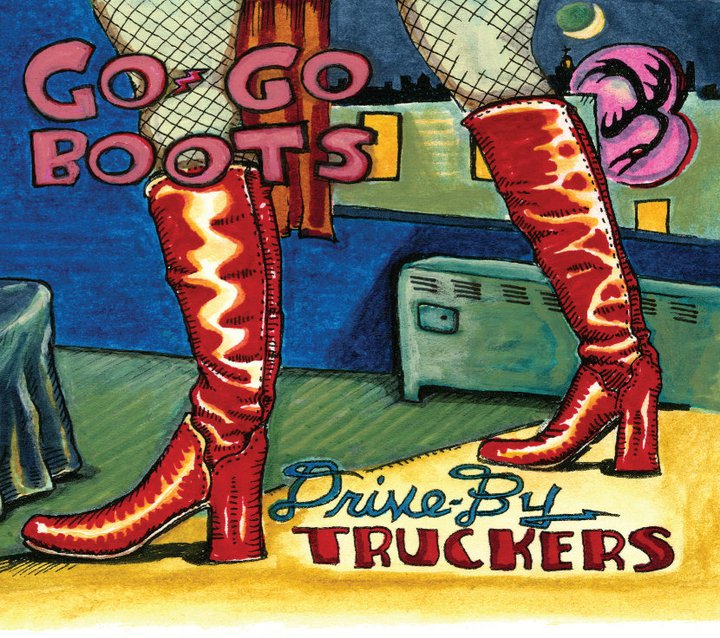
There is a corpse on the Drive-By Truckers’ new album, Go-Go Boots. Both the title track and the eight-minute forensic epic “The Fireplace Poker” are about a woman who meets a bloody end at the hands of her husband, who is a preacher. These two songs are the inverse of the true-crime saga “The Wig He Made Her Wear”, a standout from the band’s 2010 album, The Big To-Do, about a woman in a small Tennessee town who shoots her allegedly abusive husband, a Church of Christ pastor, in the back with a shotgun.
“Go-Go Boots” is the better of the two new songs, not only because it’s shorter but because songwriter Patterson Hood is more interested in the aftermath than the murder itself. The pastor’s ne’er-do-well son, with a pregnant teenage girlfriend and a job pumping gas, can’t confront his father for fear of losing his temper, so his anger just sizzles and fizzles inside him, with no outlet. Hood intimates a sad arc to his life in a single verse, an impressive lyrical trick that lends the song its considerable gravity. By comparison, “The Fireplace Poker”, with its curious guitar curlicue wrapping around Brad Morgan’s stoic drumbeat, just recounts the details of the crime and sits aghast at a man’s capacity for cruelty.
Enthralled by small-town violence (he’s reportedly working on a film about a southern crime syndicate), Hood has explored this material before, documenting crime scenes in song and relating blood splatter and gunshot residue in verse while the band draw the chalk outlines on the floor. As always, it’s the carefully chosen details that give these songs heft and personality and keep them from becoming redundant. Hood is telling stories that are rare in rock music, if not altogether nonexistent, and the Truckers boast two other songwriters with similarly distinctive styles and subject matter. Mike Cooley writes in a cursory first-person, emphasizing aw-shucks wordplay and wry self-deprecation: “The Weakest Man” is classic AM country at its wryest, while “Cartoon Gold” is his Zevon anthem, set in a dark L.A. bar seen through even darker sunglasses. “I think about you when I can,” he laments, “and sometimes when I do I still get caught.”
Over three albums (she’s been playing for five but only writing songs for three), bass player Shonna Tucker has grown into a sharp, imaginative lyricist, and her one track on Go-Go Boots shows she’s absorbed Hood and Cooley’s knack for character sketches. “Dancin’ Ricky” depicts a dancer out on the floor with a tight shirt and “freedom out in the open,” which I read as “tight pants.” Rather than depict this person as a fool, she paints a sort of antihero: “Hey Ricky, don’t let the Diabetes get you!” Tucker cheers. Tucker may not have written “Where’s Eddie”, but she sings it like she did, in a performance that’s restrained and soulful– a bit of feminine guile to offset so much masculine songwriting.
Eddie Hinton wrote “Where’s Eddie”, and the Muscle Shoals Sounds singer and friend of the Hood family figures prominently on Go-Go Boots– just as prominently as murderous preachers. The band recently recorded two covers of Hinton’s songs for Shake It Records’ singles series (Afghan Whigs’ Greg Dulli has also contributed), and both sides appear on the album, forming a mini-tribute to the troubled artist, whose success never equaled his talents and who died in 1995 largely unknown. Hood doesn’t quite have the vocal chops to put across “Everybody Needs Love” as confidently as Tucker sells “Where’s Eddie”, but thanks to the band’s exuberant take, it proves a potent block of southern soul that reveals the Truckers’ range and sensitivity beyond the Crazy Horse guitar attack of recent albums.
In fact, Go-Go Boots sounds like a slight retreat from that rock noise, indulging Cooley’s country jones as well as the band’s more acoustic tendencies. It’s a more dynamic record than The Big To-Do, recalling the ramshackle vibe of their first two albums. There’s a greater textural range, from the noir ramble of “Ray’s Automatic Weapon” to the spidery tension of “Used to Be a Cop”, one of Hood’s best character sketches. On the heels of Go-Go Boots comes the DVD release of the documentary The Secret to a Happy Ending, which chronicles the period in the mid-2000s when the Drive-By Truckers almost broke up. There’s a telling moment when former guitar player/songwriter Jason Isbell asserts that that line-up was the most solid and the most creative in the band’s long history of turnovers. It’s no reflection on him, but Go-Go Boots goes a long way to proving him wrong, suggesting a band that knows where all the bodies are buried.
— Stephen M. Deusner, February 18, 2011
